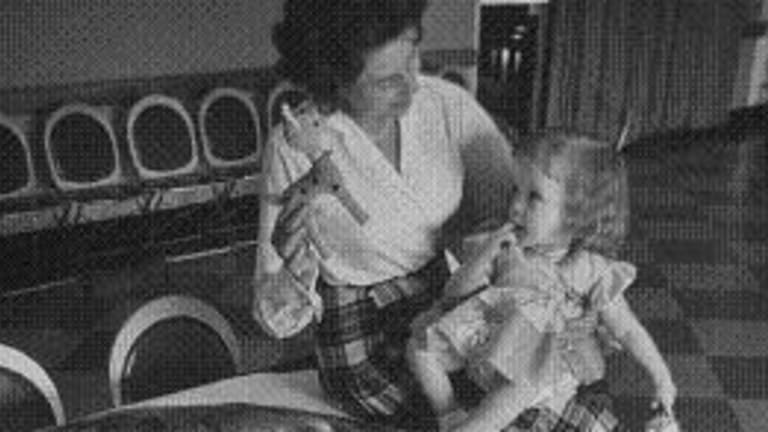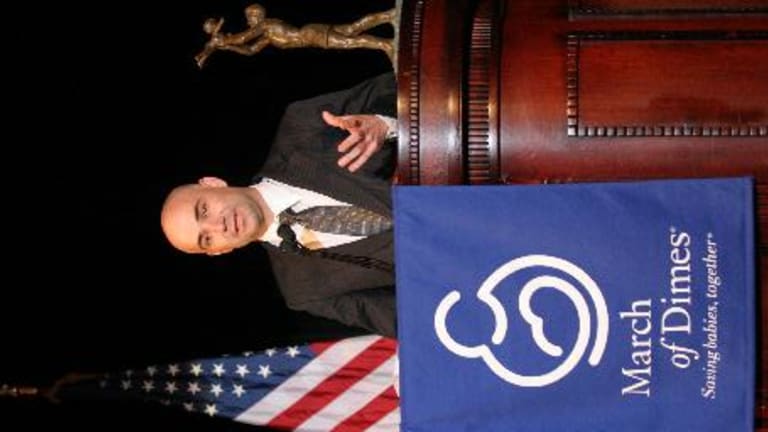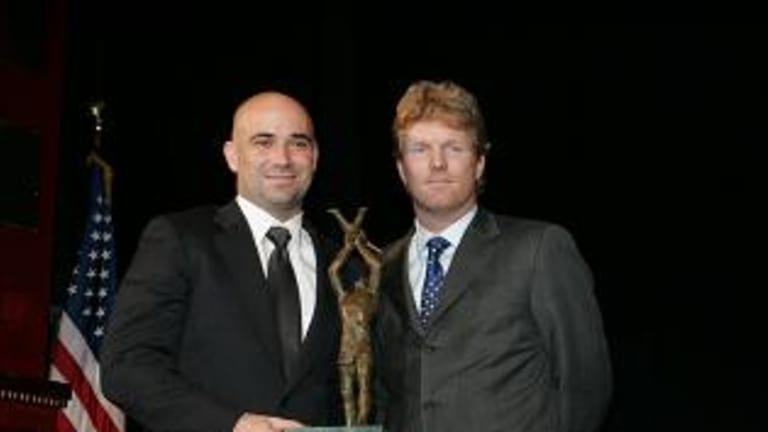So when I was invited to this March of Dimes annual awards ceremony at the elegant and decidedly old-school Waldorf-Astoria, I figured I'd drift on over, maybe get a word with Andre Agassi, who was being honored as Sportsman of the Year. Maybe ask Danica Patrick (the INDY car driver who selected MoD's Sportswoman of the Year) if she has any strong feelings about him. That kind of thing.
Becoming the Change
By Peter Bodo Nov 29, 2006Madrid, Spain
Preview: Iga Swiatek, Aryna Sabalenka run it back with another all-Top 2 Madrid final
By Steve Tignor May 03, 2024Social
"You’ll be back": Felix Auger-Aliassime writes Madrid message for injured Jiri Lehecka
By Baseline Staff May 03, 2024Madrid, Spain
Felix Auger-Aliassime reaches first ATP Masters 1000 final in Madrid when Jiri Lehecka retires
By TENNIS.com May 03, 2024Madrid, Spain
Andrey Rublev goes from slumping to sizzling by channeling emotions in "right directions"
By Steve Tignor May 03, 2024Social
Nicolas Moreno de Alboran opens up about recent health battle with dengue fever complications
By Baseline Staff May 03, 2024Madrid, Spain
Andrey Rublev defeats Taylor Fritz to reach fifth Masters 1000 final of career in Madrid
By John Berkok May 03, 2024Pick of the Day
Taylor Fritz vs. Andrey Rublev, Mutua Madrid Open
By Zachary Cohen May 03, 2024Tennis.com Interview
TEASER: Simona Halep describes pain of positive doping test in Wertheim interview
By David Kane May 03, 2024Breaking News
Muscle edema in forearm forces Carlos Alcaraz to withdraw from Rome Masters
By TENNIS.com May 03, 2024Becoming the Change
Published Nov 29, 2006
Advertising

Mod
© Time Life Pictures/Getty Images
Well, it turns out that this annual sports luncheon (23rd, and counting) is a pretty big deal. The March of Dimes is a great outfit; I remember collecting money for them in a tin can when I was a kid, at around the time that the organization was a driving force behind the elimination of Polio.
It wasn't so long ago that Polio was still a heartbreaking, crippling disease, and it occurs to me that the March of Dimes campaigns may be where the expression "poster child" originated.
I can still remember the children on those "help eradicate Polio" posters - and real, live kids in the neighborhood - hobbling around in those wretched metal leg braces and crutches.
Hats off the the March of Dimes; these days their primary mission is combating infant mortality and premature births, and the lethal dangers associated with it.
It seemed like half of Media City turned out for this event (the powerful half, including folks like Sean McManus, President of CBS News and Sports and luncheon chairman, Dick Ebersol of NBC sports, Bob Basche, of sports marketers Millsport (and a long-time NBC hand at Wimbledon), David Stern, commissioner of the NBA, Paul Tagliabue, the outgoing NFL commissioner). I got there early, but even the small room reserved for the pre-luncheon media event was soon filling up with network execs and peripheral media types. Oddly enough, there were no working representatives from mainstream media outlets.
Before things got too hectic, I bumped into Bert Sugar, the boxing icon who's a living embodiment of everything that makes The Sweet Science such a compelling and uproarious sport. "The bar isn't even open yet," Bert growled, unlit cigar in his mouth. "Five thousand of these things and I still can't get it right."
Without looking up, the bartender said: "What are you having, Bert?"
Now, that's impressive.
"Bloody." Bert growled.
And what does Bert, the Godfather of Boxing, think of Andre?
"He's not the most colorful in the crowd, but then I liked the Connors and McEnroe era myself. Mac was an okay guy but that Connors - what a pain in the ass. Tell you what I like about Agassi, though - he's one of my favorite clues in a crossword puzzle. It's all those vowels. I'm telling you, he and Felipe Alou (hall of fame baseball player) are my two favorite athletes for that reason."
Hmmmm. . .
But the celebletes were soon drifting in: Billie Jean King, Patrick, a couple of top WNBA players whose names you'll forgive me for not knowing or remembering (Donna Orender, President of the WNBA, was given the MoD Sports Leadership award), Patrick McEnroe, Jim Courier, luncheon chairman Hannah Storm, my old pal Frank DeFord. . . No Andre, though.
I worked the room a little. I got hold of Danica Patrick, an intense woman with black eyes and black hair. She said some nice things about Andre, but nothing interesting enough to quote, or even remember. I caught up with Pat Mac and Jim Courier some, talked dogs with Basche. Hannah Storm, who covered almost 10 Wimbledon tournaments for NBC, made an interesting remark about Andre: "He was a player people really invested in emotionally, he always moved emotion. That's not so common, especially among male athletes."
Billie Jean told me that Agassi's wife, Steffi, wasn't going to play World Team Tennis next year, because she almost collapsed from nerves in her single outing this past summer. Still, Billie said, wide-eyed, "You should have seen how emotional she was.Steffi! She was running around, high-fiving everyone. In some ways, she loved it." Billie also told me that Pat Rafter probably won't play WTT next year; seems it would take too much effort to stay in shape (Lazy sack of Vegemite, that one, eh?). She said he still has that spring in his legs though; he can get to a wide serve with the best of them. "That's one of the first things that goes, you know," Billie said. "That ability to explode to either side."
Still, no Andre, but you always learn something, talking to Billie.
The room was getting more and more hot and crowded. Official luncheon time was approaching. No way I get to talk with Andre under these circumstances, I figured. Then, I spotted him. He had slipped into the room, and they had him at a table for the official awards photos with his fellow honorees (the fourth honoree was Ross Greenberg, the tennis broadcast pioneer and head of HBO Sports). When they finished with that, they hustled Andre over to do a sit down with Sports New York cable network. I stood nearby and watched. Ever notice that Andre's head is a flat as the deck of an aircraft carrier? It's kind of cool looking, actually. He was a little fidgety, toying with his ring finger, and I noticed there was no wedding band on it. Sure sign of a tennis player who actually uses his left hand.
Advertising

Aa1
When Andre got up, we made eye contact. I stepped forward to shake his hand and he lit up and threw his arms around me, which made me feel good. We've always had a great relationship but for one horrible episode that was no fault of my own, and not worth going into here. Andre was always an animated guy, but he seemed so relaxed and happy at the moment that I had a realization: The Andre we had seen for, oh, the last 18-or-so months of his career was not the man complete. He was operating at perhaps 60 per cent of his natural ebullience, which still throws more sparks than most of his peers in full glory.
Conclusion: The thoughtfullness that we had come to associate with Andre - Oh, those incredibly reflective ruminations on the X's and O's of the game! Oh, those sublimely diplomatic renderings of his thoughts on retirement and career! - had been for a long time colored by tristesse, a wistfulness that dampened his spirit, if not his combative verve, in those waning days.
By contrast, today he resembled a liberated man; the guy who had just completed an enormous job, and done it so well that there was nothing else he could do at this point but exude the satisfaction and pride that accompanies the successful endeavor.
I told Andre he looked great and patted his tummy.
"Oh I'm staying in shape," he said, smiling. "And I'm enjoying it."
Did he watch the ATP Championships?
"Yeah, I did. It was great, I really enjoyed it. It was all of the good and none of the bad. I didn't have to worry about how the guy I was playing next looked, or how this result is going to impact the draw or anything like that. I really enjoyed it."
A sharp-dressed guy thrust a pen and a handful of pictures between us, looking for autographs. "Not now," Andre said, politely and firmly. "This isn't the right time."
I told him about how passionateTennisWorld's readers are; how just mentioning that I might see him today triggered an outpouring of admiration and respect from you all yesterday. "Your fans are dying to hear what you're going to be doing, tennis-wise. Going into the booth to do any commentary or anything like that?"
"No, I don't think so. Not now. I love talking tennis, you know that. But it's not the vehicle for me now. But I'll be around. I'm trying to bring it all together - the business and the philanthropy, tennis and all that ties into. I'm working on bringing that all together so it can impact lives and make a real difference."
By then, a pretty big crowd had gathered around us. One lady who had visited the Andre Agassi College Preparatory Academy stepped forward and introduced herself. A fellow anxious to get Andre's attention tugged at the back of his suit jacket. Andre fended him off. "I hate it when people start pulling me this way and that."
And the kids? I asked.
"You know what's great? That I can see them on my own terms now. It isn't like, I have this little slot here because I have to go practice now, or go play a match. It's natural."
Someone was flicking the lights on and off, it was time to go into the ballroom for the luncheon. "I better go," Andre said. "Just stay close, we'll talk after."
By then, it was after 1 PM, and I had to be up at my boy Luke's school to pick him up at 2:30. It was going to be tight. It turned out that because I had not planned to attend the luncheon, I didn't even have a seat. So I sat on a chair, back with the wait staff. I thought about Andre, and what a remarkable, seemingly improbable role he had created for himself, carving it out of doubt, confusion, even a measure of self-loathing, it seemed, for in my experience few people who have achieved anything worth remembering have not been hard on themselves, or had someone be hard on them, a pretty good ticket to the same destination.
Mike Agassi, Andre's father, had been hard on him. Andre, from about the time he made his late career resurgence, had been hard on himself. And for all of Andre's sensitivity, and the penumbra of calmness that now surrounds him, you can see traces of, if not exactly hardness, then the smoothness that characterizes a hard object that has been buffed and polished, polished and buffed.
You can see that in the many ascetic touches: the simplicity of his clothing, the measured, almost clipped speech (is there a public man who so precisely says exactly what he means, and always with an interesting, almost epigrammatic turn of phrase?), that embrace of baldness, a condition from which so many less secure men flee. I thought about the top of his head; a stone, worn by water. I laughed to myself.
Advertising

Aa2
The videos and speeches went on, as they're apt to do; Andre was the last and most important person honored.
He was introduced by Jim Courier, who said: "I remember the first time I played Andre, in a 12-and-under event in San Diego. We both had soup-bowl haircuts. Even then, his strokes were so clean, so smooth, the we all knew he'd be a great player. Now we also know he's a great man."
Jim got the laugh of the day when he said that it was tough enough for Andre to be the second best athlete in his household; having seen his kids, Jaden and Jas, on the trampoline in the backyard of the Agassi's home in Las Vegas, Jim also had the feeling that "The way things are going, he'll be sliding down even further on that scale."
And as he was wrapping up his introduction, Jim talked about a visit to Agassi Prep, and how he was struck by one of the many quotations on the wall, this one from Gandhi: Become the change you want to see.
When Andre got to the podium, he said, "New York, you're going to make me cry again."
Then he did something that is typical of Agassi these days. His predecessors on the stage had made nice acceptance speeches. Greenburg spoke about his own family's experience with premature birth. Danica Patrick had spoken of what it was like to be a girl growing up wanting to be a race car driver. Donna Orender had waxed eloquent on a similar theme, but gone on too long and with too much undisguised promotion of the NBA and WBA. Andre said nothing about his career in tennis. He opened his formal acceptance by saying, "Thirteen years ago, I realized that caring isn't enough. Caring isn't doing."
Then he went on to outline his history in charitable work, about how the most important thing he had learned was that you couldn't reach a child in need early enough. He turned the attention of the guests to the March of Dimes, reminding the audience that the group has a "thankless" job, "solving problems that the world will never see." It was a command performance; the charity event equivalent of one of his better post-match press conferences.
It's all post-match for Andre now, but not post-significance. It's probably closer to pre-significance, given his intentions and dedication to fine causes.
It was almost two-thirty, and I was worried about my own child. As the luncheon broke up, I worked my way through the crowd to Andre and told him, "Andre, I've got to go pick up my kid at school, can we catch up some time soon, maybe out in Vegas or something?"
He smiled. "Sure, call me anytime. We'll knock a few down. Hey, what am I doing?"
It was, all in all, a curious thing for him to say for a man who was busy becoming the change he wanted to see.
(Photo credits: Julio Bedoya, Harold Hechler Associates; Getty Archives)